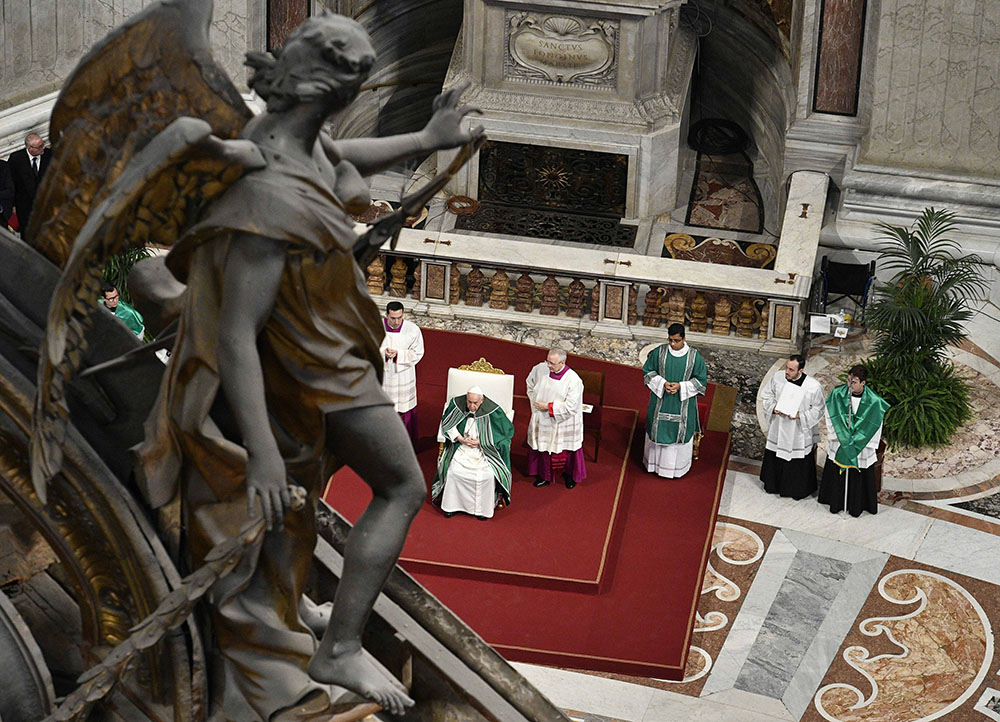
Pope Francis presides at a Mass in St. Peter's Basilica at the Vatican Oct. 29, 2023, marking the conclusion of the first session of the Synod of Bishops on synodality. (CNS/Vatican Media)
To the chagrin of headline writers everywhere, Pope Francis turned the focus of the synod heavily toward process in his letter to Cardinal Mario Grech, general secretary of the General Secretariat of the Synod. He announced the creation of 10 study groups to look at specific theologically complicated issues. The list emphasized reforming the institution, not the hot-button issues that dominated news coverage of last year's synod.
Those who want the synod to enact sweeping reforms will be disappointed that the pope cited his "Chirograph" issued on Feb. 16, which stated, in relevant part, "The Dicasteries of the Roman Curia shall cooperate, 'according to their respective specific competencies, in the work of the General Secretariat of the Synod' by setting up Study Groups that will initiate, with a synodal method, the in-depth study of some of the themes that emerged in the First Session of the 16th Ordinary General Assembly of the Synod of Bishops."
If you are familiar with the workings of the Roman Curia, you will know that expediting reform is not its usual modus operandi. As one prelate said to me after a week of painful meetings in Rome, "The reason Rome is called the 'Eternal City' is because everything in Rome takes an eternity."
The actual list of 10 subject areas is also as much inward- as outward-looking. Studying "some aspects of the relationship between the Eastern Catholic Churches and the Latin Church" is needed, as last year's synodal synthesis stated, but that was not what caught the headlines. The same for studying "some theological and canonical matters regarding specific ministerial forms." That could be explosive and it could be pedestrian.
Advertisement
The same goes for the "revision, in a synodal missionary perspective, of the documents touching on the relationship between Bishops, consecrated life, and ecclesial associations." This is undoubtedly an important topic, vital to the life of the church. Those in consecrated life always bear with them the tradition of Christian radicalism, the "Christ against culture" stance of the first Christians, to borrow from Niebuhr's taxonomy.
Still, this important effort at revision doesn't compare with blessing persons in same-sex unions for garnering clicks.
"The mission in the digital environment" is an enormously complicated, and I fear depressing, topic. The more we witness the effects on knowledge and insight that reliance on digital media yields, the more we should fear for future generations.
Those who rely on TikTok and tweets for information turn out to be poorly informed. The ability of anyone to self-publish could be a boon to democratic dialogue, but it mostly has not been. Persuasion and argument are largely unknown to the twittering class. Opinions are considered significant because they are voiced, not because they hold up to scrutiny.
No. 9 on the list — "Theological criteria and synodal methodologies for shared discernment of controversial doctrinal, pastoral, and ethical issues" — is likely to be where the fireworks are. What matters is not this hot potato or that. What matters is that the synodal study group develop a robust defense of what is arguably Francis' most significant contribution to the universal church, the elevation of pastoral theology alongside doctrinal theology in the teachings and practices of the faith.
The church must always consider what it does and does not teach, but that teaching is not a museum piece, set on the mantel, to be dusted every once in a while. What Francis has insisted is that the church, its leaders no less than the people in the pews, ask themselves how that teaching is perceived, how it is received or not.
The pope hopes that the synodal process will yield a church in mission, and that mission is proclaiming the Gospel of Jesus Christ.
The church can no more abandon its teachings than it can abandon a sacrament, but how a teaching is presented, how it is inculturated in different local churches, how one teaching relates to another, how the church's teaching in a particular instance assists or hinders the salvation of souls, all these issues are the stuff of pastoral theology.
Most of the controversies surrounding Francis have their source here, in the failure of some to understand, still less appreciate, his effort to bring pastoral theology to the fore. People fear that consideration of how a teaching is received might result in that teaching being weakened. A change of emphasis is taken as the beginning of a heresy.
Catholic identity, for the papal critics, is no longer focused on the heart of the Gospel, the proclamation of divine mercy won for us at such a dreadful price on Calvary. Instead, Catholic identity becomes wrapped up with the particulars of sexual morality or other matters that, however important, are derivative of the Gospel's central kerygma.
The pope hopes that the synodal process will yield a church in mission, and that mission is proclaiming the Gospel of Jesus Christ. The synodal process may recommend changing who can get ordained, or who can get a blessing, or how priests are trained, and a host of other important issues. But the key thing is to relate all those subsidiary issues to the central mission of the church, and these 10 study groups need to focus on how the institution can restore evangelization to its central place in the life of the church.
That may not make for great headlines. But it might just set the world on fire.







